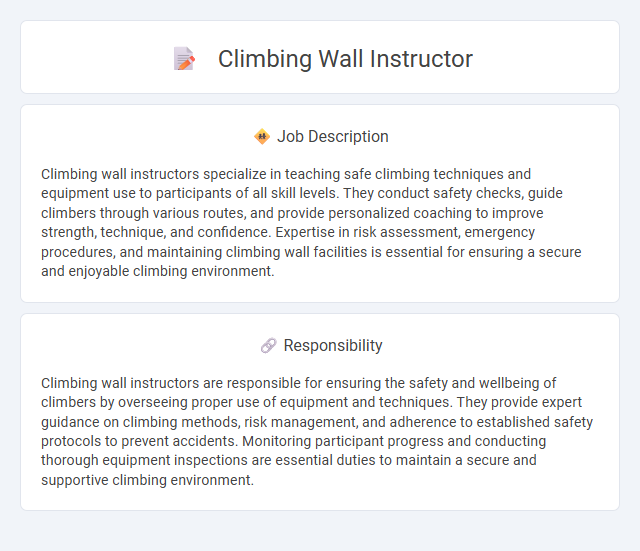
Climbing wall instructors specialize in teaching safe climbing techniques and equipment use to participants of all skill levels. They conduct safety checks, guide climbers through various routes, and provide personalized coaching to improve strength, technique, and confidence. Expertise in risk assessment, emergency procedures, and maintaining climbing wall facilities is essential for ensuring a secure and enjoyable climbing environment.
Individuals with strong physical fitness, good balance, and a passion for climbing will likely find the role of a climbing wall instructor suitable. Those who enjoy teaching, possess excellent communication skills, and demonstrate patience may be better adapted to handle the responsibilities. People with a fear of heights or limited upper body strength might struggle to meet the job's demands.
Qualification
A climbing wall instructor must possess comprehensive knowledge of climbing safety protocols, equipment usage, and rescue techniques, supported by certifications such as the Climbing Wall Instructor (CWI) qualification from recognized bodies like the Association of Mountaineering Instructors (AMI) or the Climbing Wall Association (CWA). Practical experience in leading climbing sessions, instructing beginners, and assessing climbers' skills is essential for ensuring a safe and effective learning environment. Strong communication skills and a background in first aid certification further enhance the instructor's ability to manage emergencies and provide clear guidance.
Responsibility
Climbing wall instructors are responsible for ensuring the safety and wellbeing of climbers by overseeing proper use of equipment and techniques. They provide expert guidance on climbing methods, risk management, and adherence to established safety protocols to prevent accidents. Monitoring participant progress and conducting thorough equipment inspections are essential duties to maintain a secure and supportive climbing environment.
Benefit
Working as a climbing wall instructor likely offers significant health benefits due to the physical activity involved, promoting improved strength and endurance. The role probably enhances interpersonal skills and teamwork, as instructors guide and motivate climbers of all levels. There is also a strong potential for personal satisfaction and confidence growth from helping others achieve their climbing goals.
Challenge
A climbing wall instructor job likely involves managing physical and mental challenges to ensure safety and skill development for participants. The role probably requires problem-solving abilities to adapt teaching methods for varying skill levels and respond swiftly to unexpected situations. Embracing these challenges may enhance leadership and communication skills in a dynamic, high-risk environment.
Career Advancement
Progressing as a climbing wall instructor involves gaining certifications such as AMGA or IFMGA, enhancing skills in safety protocols, and mastering advanced climbing techniques. Career advancement opportunities include roles like lead instructor, program coordinator, or climbing gym manager, often requiring experience in staff training and facility operations. Building a strong client rapport and developing specialized courses can also position instructors for higher-paying roles and leadership positions within outdoor recreation companies.
 kuljobs.com
kuljobs.com